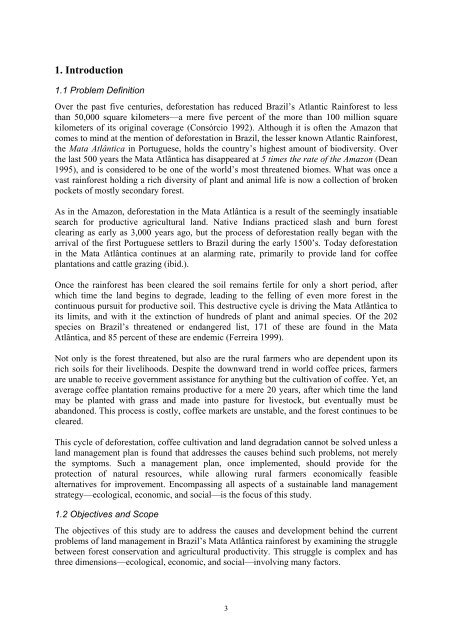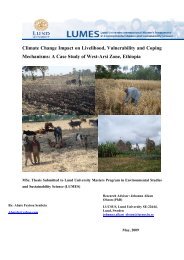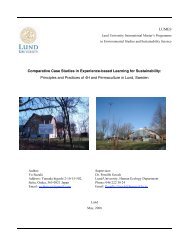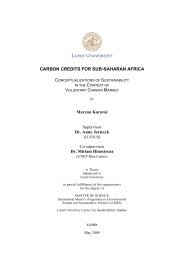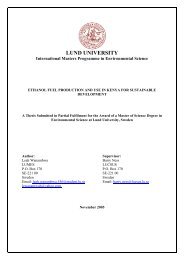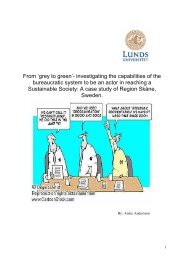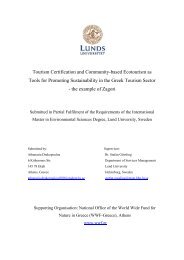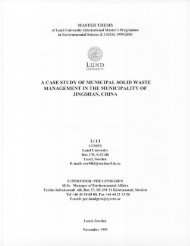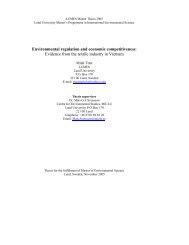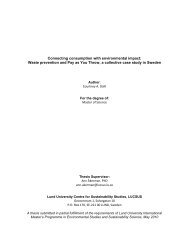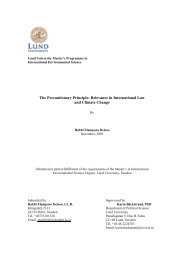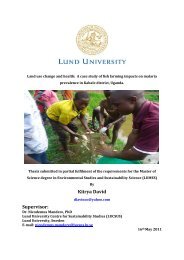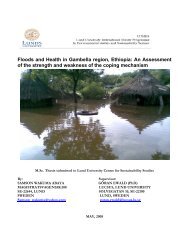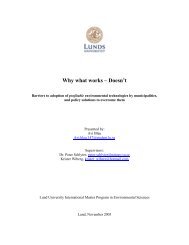Deforestation, Coffee Cultivation, and Land Degradation ... - lumes
Deforestation, Coffee Cultivation, and Land Degradation ... - lumes
Deforestation, Coffee Cultivation, and Land Degradation ... - lumes
You also want an ePaper? Increase the reach of your titles
YUMPU automatically turns print PDFs into web optimized ePapers that Google loves.
1. Introduction1.1 Problem DefinitionOver the past five centuries, deforestation has reduced Brazil’s Atlantic Rainforest to lessthan 50,000 square kilometers—a mere five percent of the more than 100 million squarekilometers of its original coverage (Consórcio 1992). Although it is often the Amazon thatcomes to mind at the mention of deforestation in Brazil, the lesser known Atlantic Rainforest,the Mata Atlântica in Portuguese, holds the country’s highest amount of biodiversity. Overthe last 500 years the Mata Atlântica has disappeared at 5 times the rate of the Amazon (Dean1995), <strong>and</strong> is considered to be one of the world’s most threatened biomes. What was once avast rainforest holding a rich diversity of plant <strong>and</strong> animal life is now a collection of brokenpockets of mostly secondary forest.As in the Amazon, deforestation in the Mata Atlântica is a result of the seemingly insatiablesearch for productive agricultural l<strong>and</strong>. Native Indians practiced slash <strong>and</strong> burn forestclearing as early as 3,000 years ago, but the process of deforestation really began with thearrival of the first Portuguese settlers to Brazil during the early 1500’s. Today deforestationin the Mata Atlântica continues at an alarming rate, primarily to provide l<strong>and</strong> for coffeeplantations <strong>and</strong> cattle grazing (ibid.).Once the rainforest has been cleared the soil remains fertile for only a short period, afterwhich time the l<strong>and</strong> begins to degrade, leading to the felling of even more forest in thecontinuous pursuit for productive soil. This destructive cycle is driving the Mata Atlântica toits limits, <strong>and</strong> with it the extinction of hundreds of plant <strong>and</strong> animal species. Of the 202species on Brazil’s threatened or endangered list, 171 of these are found in the MataAtlântica, <strong>and</strong> 85 percent of these are endemic (Ferreira 1999).Not only is the forest threatened, but also are the rural farmers who are dependent upon itsrich soils for their livelihoods. Despite the downward trend in world coffee prices, farmersare unable to receive government assistance for anything but the cultivation of coffee. Yet, anaverage coffee plantation remains productive for a mere 20 years, after which time the l<strong>and</strong>may be planted with grass <strong>and</strong> made into pasture for livestock, but eventually must beab<strong>and</strong>oned. This process is costly, coffee markets are unstable, <strong>and</strong> the forest continues to becleared.This cycle of deforestation, coffee cultivation <strong>and</strong> l<strong>and</strong> degradation cannot be solved unless al<strong>and</strong> management plan is found that addresses the causes behind such problems, not merelythe symptoms. Such a management plan, once implemented, should provide for theprotection of natural resources, while allowing rural farmers economically feasiblealternatives for improvement. Encompassing all aspects of a sustainable l<strong>and</strong> managementstrategy—ecological, economic, <strong>and</strong> social—is the focus of this study.1.2 Objectives <strong>and</strong> ScopeThe objectives of this study are to address the causes <strong>and</strong> development behind the currentproblems of l<strong>and</strong> management in Brazil’s Mata Atlântica rainforest by examining the strugglebetween forest conservation <strong>and</strong> agricultural productivity. This struggle is complex <strong>and</strong> hasthree dimensions—ecological, economic, <strong>and</strong> social—involving many factors.3


